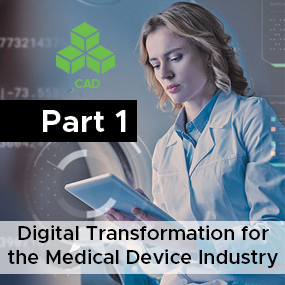Companies that design and develop medical devices face regulatory compliance burdens that can significantly hinder their ability to innovate. From engineering design handover to manufacturing, to traceability and collecting audit-ready data, medical technology professionals are primed for digital transformation across the enterprise to help them achieve their business goals.
This article is the first of a three-part series summarising LEAP’s recent webinar, Digital Transformation for the Medical Device Industry which took an in-depth look at how PTC solutions are helping medical device and life sciences companies with:
- Regulatory and compliance management,
- Quality (CAPA, audit, non-conformance),
- Maintenance of the DHF/DMR,
- Training, tracking and delivery,
- Smart Factory initiatives,
- Generative design and additive manufacturing,
- Improving post-market surveillance.
In the clip below, Allan Thompson, PTC Technical Manager at LEAP Australia provides an overview of the challenges medical device and life science companies face related to quality, compliance and continuous performance improvement. Allan then goes on to explain the concept of the Digital Thread and how it pertains to the Digital Organisation – using technology to connect the products, people, places and processes within an organisation. Finally Allan explains how the Digital Thread can benefit MedTech manufacturers by addressing the core issues that these companies face, in turn improving efficiency, quality, reliability and time to market.
In the next clip Allan takes a deeper dive into Creo and explains how PTC’s integrated CAD solution supports the needs of engineers and downstream users throughout the product development lifecycle.
Creo features such as variable density lattice design, AI driven generative design and model based definition are explored here with a particular focus on their potential benefits to the design processes of MedTech companies, enabling the creation of light-weight, customisable and reusable components and products that are essential to the industry.
We trust you found part one of this three part series informative. Part two will look at how PTC’s Product Lifecycle Management (PLM) and Application Lifecycle Management (ALM) platforms help to empower the wider organisation by providing integrated platforms that act as the single source of truth across the entire product development process.
If you would like more information on anything covered in this article, please contact LEAP to speak with an expert today!

